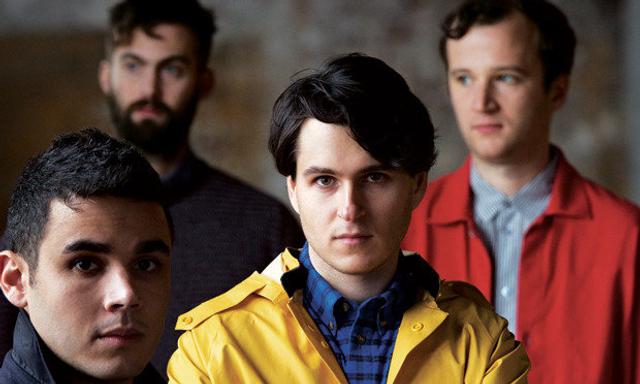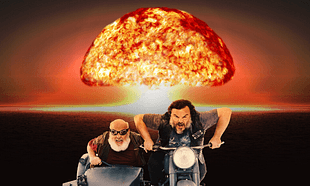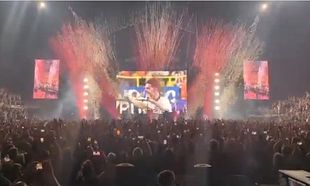Vampire Weekend's third album is very appropriately titled Modern Vampires of the City. With it they have navigated a different trail to that of their first two (hugely successful) albums. Having very much worked in-house in the past, the Ezra Koenig and his band opted to take in the opinion of producer Ariel Rechtshaid, who has an eclectic resume ranging from Cass McCombs to Kylie Minogue. Does this signal a change of tack, or is it all business as usual for the NY fourpiece? John Balfe caught up with Ezra for a chat about the recently released album.
Can you explain the preparation and production of Modern Vampires of The City and if it was in any way different to the other two that came before it?
In some ways it was different. Rostam (Batmangli) and I took a trip to a writer's retreat in Martha's Vineyard, specifically to write songs, which we had never done before. We worked for a lot of it in a studio in LA with a co-producer Ariel Rechtshaid, which was something we had never done before either. For me, at the heart of it, us getting together, writing songs and working on records has stayed pretty consistent from the album to album.
You mention the retreat to Martha's Vineyard, how much of the album was borne out there?
That was towards the end, so we had already done a lot and had songs we felt strongly about but we had this feeling that we weren't quite there. We wrote about three of the final songs there, so that's a good solid 25% of the album.
Correct me if I'm wrong but I read some of the album was written and when you were still touring the last album. Does that transient atmosphere bleed into the album? For example, in other words, would you have written the same record if you had stayed in New York City?
I generally don't know. We didn't work together formally that much during the tour for it but we separately took notes and wrote but whether location influences I can't say exactly, but it probably does.
I understand you didn't have a strict deadline hanging over your head with this album; you were allowed to work at your own place. Is that a more creatively fertile atmosphere for you to work in?
It's equally fertile, it's just different. It's still stressful because even if the time constraint is gone and the existential career issues are gone you feel in early days - like how every move you make is a big deal - there's still that personal creative drama you have to deal with because even if you feel pretty confident that you have good fans that will listen to your music and people who will still write about it, you still have to truly feel confident about releasing it into the world. You have to work very hard on it. There are times you feel bad about it and times you feel great about it. The lack of a time constraint certainly made some things easier but ultimately every album is equally hard to make. I always imagined it would get easier. When we were just starting out and nobody cared about us, I always thought, 'wow I can't wait 'til we are an established band like those guys. Finally we'll be free from all the nervousness and dread'. Then
I realised, it's not that it gets easier, it's that you have the option for it to get easier. The more that you achieve and do, the easier it is to coast if you want to, but if you really want to maintain that spark you had from the beginning, it doesn't get easier, it gets harder. That's the sad truth. That's how we've been. We like to put pressure on ourselves because you don't know what the world's going to think, they might love it, they might think it's garbage so as long as you feel it's the best thing you can go out there with.
With that frame of thought in mind, what was your reaction when it charted so well both at home, across Europe and seemingly across the world?
I was very happy. To me, I was just talking about how the biggest thing is to feel like you achieved the creative things you wanted to achieve and that's true but the people I've always loved the most - like The Clash, The Beastie Boys or Radiohead - have found that very thin, weird middle ground of doing exactly what you want to do and being as weird as you want to be and still finding some degree of mainstream success because, I believe, there isn't any real difference between weird music and normal music, independent music or mainstream music.
You have got to give people credit that they can understand any music. Our music is not supposed to be super hard to get into, so something like charting well and having some number one albums in America means that a fairly large number of people are giving your music a shot. That's how it's supposed to be. There's nothing cool about making music for a tiny number of high brow people, though that's not something we've ever been accused of. That's never been who we are and that's not who our audience is. In that respect, it feels very meaningful when you can have this random achievement like a number one album, it's just a number but it is symbolic.
It must be rewarding to know that it resonates, it's kind of a societal thing in all walks of life that people want to be heard or listened to and that's true of bands too.
Sure, and we've always said that we make pop music because that's what we love and it's certainly an imprecise description but more or less the art form that we operate in post world war two pop music. Pop music is inherently popular. The melodies are supposed to be memorable and catchy. The songs are supposed to be relatively concise, and when you think about it even a ten minute pop song is still more concise than other types of music like some long orchestral piece. If you truly believe in that form and admire the history and where it's at now then of course you someday want your music to be popular. I think as long as you're not making creative decisions in a crass way, then you are in the clear. Ultimately, I feel every time we followed our instincts, our audience has been right there with us.
I don't know how many songs you recorded in the run up to this album and what influenced your decision but what are the criteria for which songs made it onto the final record. Was it a case by case by case situation or was there a theme?
It's not that simple. Sometimes it's simply about quality but that's so subjective. Sometimes it's a case of 'that song is better, more interesting and meaningful, catchier than that one', but then as the dust settles and this album's out there, there are little ideas we started then that I can look over what we worked on, there are things we started cooking up then that I think 'oh that could be kind of cool'. So it's either about what works for the album - does it thematically fit, is it good enough - or then the toughest part is when somebody writes a great part for one song, somebody writes a great verse let's say, some beautiful piano part but it's not a song and if you can't figure out how to make it a song then it's just a part. It'll remain just that. That's what's crazy about it, the end product of what we do, like everyone else in music, is release recorded songs. Even if someone sits down and writes a great song on an acoustic guitar and the lyrics are power with a beautiful melody but you can't figure out what it should sound like or how it should be produced, it doesn't really get you anywhere because that's not what making an album is. Sometimes that's really difficult when you know the song could be really good but you can't quite figure out how to finish writing it. It never hurts to sit on stuff. On this album, the song 'Hannah Hunt' started almost seven years ago. I started writing that song on an acoustic guitar in my dorm room seven years ago. If I had released me singing with the acoustic guitar it would've been a million times worse because there's so much great stuff that came from us working hard on it and collaborating.
Did you ever work on Hannah Hunt before this album with the band, for another album?
We always bust it out, but it was always kind of obvious stuff. Even though when the band started we already had broad musical taste, it's not like when we made that album we only listened to African music or classical music or punk, whatever. We also had a very strong sense of what the band should be though, so I do remember we started playing a song like Hannah Hunt which has a very slow, almost country feel to it and it just didn't make sense. On Contra we started changing the way we worked a little bit. Rostam and I started choking up a lot more stuff in the studio and that time we worked on a version of Hannah Hunt that made a little more sense but still wasn't quite right but all of these steps were necessary because we knew it was a good song. Finally now on this album not only did we know how to arrange it but this was the album it belonged on.
Vampire Weekend will play Longitude on Saturday 20th July. Tickets are on sale now.









































































